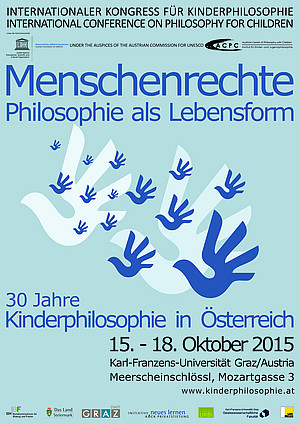International Conference of Philosophy for Children 2015
"30 years of Philosophy for Children in Austria Human Rights - Philosophy as a Form of Life"
from 15 - 18 October 2015 in Graz/Austria
Increasing global conflicts, from contrasts between value and knowledge orientations to world views, mean facing new major challenges. Conflicts between ways of life are particularly evident in the area of tension between divergent cultures - they point to a close link between the facts of life and the diversity of ways of life, problems of intercultural understanding and cooperation. The central issue is a redefinition of the relationship between opportunities and dangers in the 21st century.
Transformation processes in the direction of specific new forms of enlightening, increasingly human rights-based changes in democratisation offer opportunities for new forms of living together and for increased cooperation between different cultures. This harbours new potential for integration and inclusion. As a result, completely new forms of connections between communicative structures of action and ways of life can emerge.
This involves the important renewal of relationships between interculturality, cultural/ethnic identities, interdisciplinarity and transdisciplinarity on the one hand and cultural diversity on the other.

The complexity of globalisation processes conceals "new thinking". In the field of education, this is reflected in the transformation of educational plans. It is precisely here that the congress aims to take up the increasingly intensive, critical debates - about the significance of "educational plans" - and generate new concepts. This in turn requires the development of specific strategies with the aim of promoting critical, creative and empathetic thinking, intercultural dialogue and the emergence of new identities, which can arise within the framework of the possibilities of our commitment to working together.
Philosophising with children and young people will become increasingly indispensable in the future, as it contributes to the promotion of perception, interpretation, argumentation and critical reflection and judgement skills and, due to its "enlightenment-oriented" self-image, can mediate between science and the living world and strengthen reflective potential.
Philosophising is an exercise in the conscious use of language, attentive and alert listening, looking and perceiving, which leads to a critical, open-minded attitude that does not allow world views to be imposed on it. The aim is to enable children and young people to orientate themselves in a pluralistic, democratic society through their own thinking and to shape their lives in a self-determined way and also to contribute to both advancing and better justifying democratic degrees of freedom.
This reflective examination of different ideas, concepts and ways of life can not only help to reduce violence and aggression, but also develop solution strategies and offer conflict resolution aids.
The aim of the congress is to discover the diversity of ways of life, to promote intercultural and interdisciplinary dialogue and the exchange between different philosophical approaches and theories in the context of today's world. Research and practice-orientated projects, including philosophising with children and young people, are presented and examined in a new light.
The Austrian Society for Philosophy with Children is organising its traditional congress with the aim of building bridges to various scientific disciplines in addition to a philosophical debate and thus making further knowledge bases explicit for educational concepts as well as for educational policy initiatives.
The topics of the congress will focus on the following areas:
- Philosophy and human rights
- Understanding democracy
- Community of Inquiry (research community)
- Philosophy and cultural diversity
- Diversity of life forms
- Philosophy of language
- Connections between communication and way of life
- Inter- and transdisciplinarity - multiculturalism
- Lifelong learning: philosophical perspectives and education
- Philosophy and educational processes
- Expectation horizons of children and young people